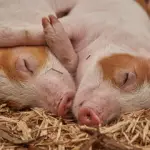
If you’ve seen a property on your search for a new home and you discover it’s next to a farm, you may ask is this a good or a bad thing and should you buy it? There are a number of pros and cons of living near a farm, which is why it’s important to consider carefully before you buy a house next to a farm.
The main pros of living next to a farm include enjoying life in the countryside where the air is cleaner and where you’ll enjoy less noise and exhaust pollution from city traffic. Whereas the cons of living next to a farm include nasty smells, increased dust, flies and rodents.
Please also take time to read this article to discover how you could save over £70,000 on your next mortgage if you sell your house and rent before buying again. Even I was amazed when I did the calculations!
As with anything, there are always pros and cons to consider. As far as buying a house next to a farm the pros and cons include.
What are the pros of living next to a farm?
- Clean country air: Living next to a farm means the house is likely to be in the countryside, which means enjoying clean fresh country air, with less noise and exhaust pollution when compared to city living.
- Great if you work on the farm: It will be a big benefit if you work on the farm, as you could walk to work.
- Job opportunities for your children: Farms are great for your children to get part-time jobs to earn pocket money.
- More valuable property: Properties next to farms with great views in the countryside tend to be worth more than homes in built up areas.
- Cheaper homes near pig and poultry farms: Not everyone wants to live next to a pig farm or a poultry farm, which may mean you get a house for a good deal. But bear in mind the same may be true when you come to sell, and this is likely to be reflected in the re-sell value.
- There are great walks: Living next to farms and farmland means you have the opportunity for great countryside walks. But make sure to respect the countryside and be careful about trespassing on farmland.
What are the cons of living next to a farm?
- Bad smells: There can be horrible manure smells from farms, which is especially the case with pig farms and poultry farms and when the wind is in a downwind direction.
- More rodents: There are more rodents near farms, which includes rats and mice that will often get into nearby houses for food and warmth, especially in the winter.
- Bad for people with allergies like hay fever: If you have allergies like hay fever, living next to a farm and in the countryside you may mean you suffer more from this allergy.
- Farms produce lots of dust: Farms can be very dusty, especially from pigs and poultry farms which can travel to nearby homes.
- Farms can be noisy: Some farms can be noisy, for example, pigs have loud squeals, cows moo loudly and some farms have cockerels, which crow early in the morning.
- Some research has found that living near farms is unhealthy: Some studies have shown that living next to farms can be unhealthy.
- More snakes: Where snakes are to be found they are more likely to be found near farms and on farmland, as snakes will be attracted by the rodents. If you know your region doesn’t have snakes, cross this con off the list.
- Houses are harder to sell near smelly pig farms: Living next to a pig farm may decrease the value of the house and will likely make it more difficult to sell.*
- Aerial spraying: Some farmers use aerial crop spraying with planes and helicopters, which can be harmful if breathed in. But crop spraying is only done a few times a year.
- Mud on the Roads: In the winter and when it rains, farming vehicles spread mud on roads which makes a real mess.
- Noisy farm equipment: Farming equipment can be noisy and will drive up and down the roads near the farm.
- Early starts and late finishes: Farmers start work early and at certain times of the year work late, so you may get disturb by noises from this activity.
- Noisy cockerels: Many farms have chickens and this may include a cockerel, which are very noisy in the morning when they cockadoodledoo.
- More flies: Due to the nature of farms and farming, especially livestock farming which produces manure, there are bound to be more flies to contend with.
Weighing up the pros and cons of living next to a farm
Whilst on the face of it there are more cons than pros of living next to a farm, this shouldn’t necessarily put you off from buying a house next to a farm. But make sure to do your research, and make sure you know what smells are likely to be coming from the farm
I’ve lived in the countryside for a large part of my life, and lived next door to farms too, and I prefer countryside living to living in a city any day of the week.
As you try to decipher the pros and cons of living next to a farm, it’s going to be a matter of looking at each one of the cons of living next to a farm and deciding if any of these bother you. Ask the question; are any of them deal breakers?
For example, the bad smells are worse with certain types of farm, including pig farms and poultry farms, but even living next to a pig farm or a poultry farm, you don’t smell the bad manure smells every day. Plus if the farm is an arable farm with no livestock at all, there won’t be any bad smells in any case.**
For me, the deal breaker is pig farms, as I really don’t like the smell of pig manure. It would have to be a very, very nice house to persuade me to buy it if the house was next to a pig farm. I’d also always be worried about selling the house in the future.
Having lived in the countryside, I’ve also had to live with having many rodents near my houses for years. I’ve even had rats in my house, my parents had rats in the thatch of the thatched cottage they owned where I grew up. I also once caught 30+ mice in one house I had, but rodents would not stop me from living in the countryside or next to a farm.
* My parents had problems selling their house which was next to a pig farm, and the final sale nearly fell through as a result of the pig smells.
** Bear in mind that farmers change what they farm and can switch to farming livestock at any time. Also, farms change hands, and just because the present farmer doesn’t farm livestock now, this doesn’t mean a new farm owner won’t. This can easily work the other way too, for example, a new farmer may not like farming pigs.
Before buying a house next to a farm, and as you weigh up the pros and cons of living next to a farm, make sure to visit the house on more than once occasion. Do your research into the type of farm that is next to the house.
Try visiting the house when it is downwind of the farm, especially if it’s a pig farm, to see if you could cope with the smell. If the wind is not towards the house, position yourself downwind of the farm and see how bad the smells are.
Please don’t forget to read this before you leave…
Please don’t forget to also read this article to discover how you could save over £70,000 on your next mortgage if you sell your house and rent before buying again. As I said earlier, even I was amazed when I did the calculations!
I hope you’ve enjoyed this article about the pros and cons of living next to a farm
If you’ve enjoyed this article about “the pros and cons of living next to a farm” please share it on your favourite social media site.
Also, if you have any questions, please feel free to comment below too. Please also share any of your experiences with properties you’ve bought. Alternatively, if you need more help, please feel free to contact us on our contact us page here. Or join the discussion and ask your question in the property forum.




